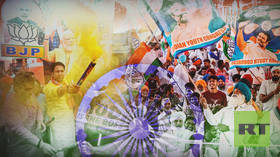Key ministers reappointed in Modi’s new cabinet
A day after the PM and over 70 ministers took the oath of office, key posts in India’s new government have been filled
Ministers for key portfolios in India’s new government, formed after the recent elections concluded, were announced on Monday. Those in key posts, including foreign, defense, finance, and home affairs, have been reappointed.
The official announcement came a day after Bharatiya Janata Party (BJP) leader Narendra Modi and 71 ministers – half of them having served in the outgoing council, representing over a dozen parties from the BJP-led National Democratic Alliance (NDA) bloc, which secured the majority of seats (293) in the 543-seat lower house of parliament – took their oaths of office.
The council of ministers includes 30 cabinet ministers, 36 ministers of state (who are junior to cabinet ministers) and five ministers of state with independent charge (who take part in cabinet meetings on important issues).
According to a press communique from the office of Indian President Droupadi Murmu, senior BJP leaders, including Rajnath Singh, Amit Shah, Nitin Gadkari, Nirmala Sitharaman, and Subrahmanyam Jaishankar, are retaining their portfolios as defense, home, roads and transport, finance, and foreign ministers respectively.
Several newly inducted ministers include the BJP’s J.P. Nadda as minister of health, chemicals and fertilizers, Shivraj Singh Chauhan as minister of agriculture and farmers welfare, and Manohar Lal Khattar as minister of power and urban affairs; H.D. Kumaraswamy of the Janata Dal (Secular) party (a key NDA alliance member) as minister of heavy industries and steel, and Kinjarapu Ram Mohan Naidu of the Telugu Desam Party (TDP) (another powerful ally in the bloc) as aviation minister.
Unlike the elections of 2014 and 2019, when the BJP secured a parliamentary majority (at least 272 seats out of 543) on its own, this time it fell short by over 30 seats in the Lok Sabha (lower house), and had to rely on the support of its allies to form the government.
Earlier on Monday, Modi, speaking at the first meeting with Prime Minister’s Office (PMO) staffers in his new term in office, said he hopes the PMO is seen not as a “power center” as it had previously been perceived, but a “people’s PMO.”
“When it comes to the government, it is not just Modi alone, thousands of minds that are connected to him, thousands of brains that are working on this, thousands of arms that are working on this – as a result of this grand form, even the common man gets to meet its capabilities,” he said.
He also said his focus is “nation first,” and his only motivation is “Viksit Bharat” (Developed India), adding that this is also his expectation from those working in the government. “We must take the nation to the heights no other nation has ever achieved,” Modi stated.
India’s economy grew by 8.2% in the 2023-24 financial year, exceeding analysts’ expectations, government data released last week shows. In comparison, GDP grew by 7% in the preceding fiscal year. The robust growth has been attributed to a strong rebound in the manufacturing sector and a continuing surge in construction and services. In 2022, the country leapfrogged the UK to become the fifth-largest economy in the world, worth $3.7 trillion. India is now projected to surpass Germany and Japan to become the third-largest economy by the end of the decade.
Where India Meets Russia: Follow and share RT India on X and Instagram
You can share this story on social media:








Comments are closed.